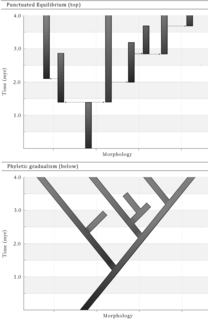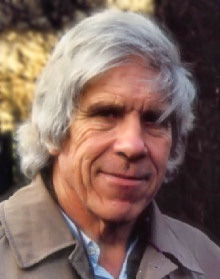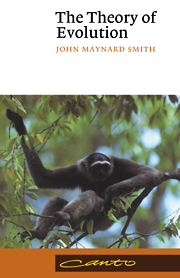An evolutionarily stable strategy (ESS) is a strategy that is impermeable when adopted by a population in adaptation to a specific environment, that is to say it cannot be displaced by an alternative strategy which may be novel or initially rare. Introduced by John Maynard Smith and George R. Price in 1972/3, it is an important concept in behavioural ecology, evolutionary psychology, mathematical game theory and economics, with applications in other fields such as anthropology, philosophy and political science.

John Maynard Smith was a British theoretical and mathematical evolutionary biologist and geneticist. Originally an aeronautical engineer during the Second World War, he took a second degree in genetics under the well-known biologist J. B. S. Haldane. Maynard Smith was instrumental in the application of game theory to evolution with George R. Price, and theorised on other problems such as the evolution of sex and signalling theory.
A meme is an idea, behavior, or style that spreads by means of imitation from person to person within a culture and often carries symbolic meaning representing a particular phenomenon or theme. A meme acts as a unit for carrying cultural ideas, symbols, or practices, that can be transmitted from one mind to another through writing, speech, gestures, rituals, or other imitable phenomena with a mimicked theme. Supporters of the concept regard memes as cultural analogues to genes in that they self-replicate, mutate, and respond to selective pressures.
Memetics is the study of information and culture based on an analogy with Darwinian evolution. Proponents describe memetics as an approach to evolutionary models of cultural information transfer. Memetics describes how an idea can propagate successfully, but doesn't necessarily imply a concept is factual. Critics contend the theory is "untested, unsupported or incorrect". It has failed to become a mainstream approach to cultural evolution as the research community has favored models that exclude the concept of a cultural replicator, opting mostly for gene-culture co-evolution instead.

In evolutionary biology, punctuated equilibrium is a theory that proposes that once a species appears in the fossil record, the population will become stable, showing little evolutionary change for most of its geological history. This state of little or no morphological change is called stasis. When significant evolutionary change occurs, the theory proposes that it is generally restricted to rare and geologically rapid events of branching speciation called cladogenesis. Cladogenesis is the process by which a species splits into two distinct species, rather than one species gradually transforming into another.

Richard Dawkins is a British evolutionary biologist and author. He is an emeritus fellow of New College, Oxford and was Professor for Public Understanding of Science in the University of Oxford from 1995 to 2008. An atheist, he is well known for his criticism of creationism and intelligent design.

Stephen Jay Gould was an American paleontologist, evolutionary biologist, and historian of science. He was one of the most influential and widely read authors of popular science of his generation. Gould spent most of his career teaching at Harvard University and working at the American Museum of Natural History in New York. In 1996, Gould was hired as the Vincent Astor Visiting Research Professor of Biology at New York University, after which he divided his time teaching between there and Harvard.

The Selfish Gene is a 1976 book on evolution by the ethologist Richard Dawkins, in which the author builds upon the principal theory of George C. Williams's Adaptation and Natural Selection (1966). Dawkins uses the term "selfish gene" as a way of expressing the gene-centred view of evolution, popularising ideas developed during the 1960s by W. D. Hamilton and others. From the gene-centred view, it follows that the more two individuals are genetically related, the more sense it makes for them to behave cooperatively with each other.

The Blind Watchmaker: Why the Evidence of Evolution Reveals a Universe without Design is a 1986 book by Richard Dawkins, in which the author presents an explanation of, and argument for, the theory of evolution by means of natural selection. He also presents arguments to refute certain criticisms made on his first book, The Selfish Gene. An unabridged audiobook edition was released in 2011, narrated by Richard Dawkins and Lalla Ward.

William Donald Hamilton was a British evolutionary biologist, widely recognised as one of the most significant evolutionary theorists of the 20th century.

George Christopher Williams was an American evolutionary biologist.
The Major Transitions in Evolution is a book written by John Maynard Smith and Eörs Szathmáry. At the time of its publication, Egbert Giles Leigh, Jr reviewing for Evolution commented that it "may be the most important book on evolution since R.A. Fisher's (1930) The Genetical Theory of Natural Selection".
Professor Geoffrey Alan Parker FRS is an emeritus professor of biology at the University of Liverpool and the 2008 recipient of the Darwin Medal. Parker has been called “the professional’s professional”.

A unit of selection is a biological entity within the hierarchy of biological organization that is subject to natural selection. There is debate among evolutionary biologists about the extent to which evolution has been shaped by selective pressures acting at these different levels.

Evolution and the Theory of Games is a book by the British evolutionary biologist John Maynard Smith on evolutionary game theory. The book was initially published in December 1982 by Cambridge University Press.

With gene defined as "not just one single physical bit of DNA [but] all replicas of a particular bit of DNA distributed throughout the world", the gene-centered view of evolution, gene's eye view, gene selection theory, or selfish gene theory holds that adaptive evolution occurs through the differential survival of competing genes, increasing the allele frequency of those alleles whose phenotypic trait effects successfully promote their own propagation. The proponents of this viewpoint argue that, since heritable information is passed from generation to generation almost exclusively by DNA, natural selection and evolution are best considered from the perspective of genes.

Richard Dawkins: How a Scientist Changed the Way We Think is a festschrift of 25 essays written in recognition of the life and work of Richard Dawkins. It was published in 2006, to coincide with the 30th anniversary of the publication of The Selfish Gene. A wide range of topics is covered from many fields including evolutionary biology, philosophy, and psychology. Space is also given to writers who are not in full agreement with Dawkins. The book is edited by two of Dawkins' former PhD students, Alan Grafen and Mark Ridley. (ISBN 9780199291168)

The Oxford Book of Modern Science Writing is an anthology of scientific writings, arranged and introduced by Richard Dawkins of the University of Oxford. Published first in March 2008, it contains 83 writings on many topics from a diverse variety of authors, which range in length from one to eight pages. All inclusions are dated post-1900, and include poetry, anecdotes, and general philosophical musings.
"Precambrian rabbits" or "fossil rabbits in the Precambrian" are reported to have been among responses given by the biologist J. B. S. Haldane when asked what evidence could destroy his confidence in the theory of evolution and the field of study. The answers became popular imagery in debates about evolution and the scientific field of evolutionary biology in the 1990s. Many of Haldane's statements about his scientific research were popularized in his lifetime.













